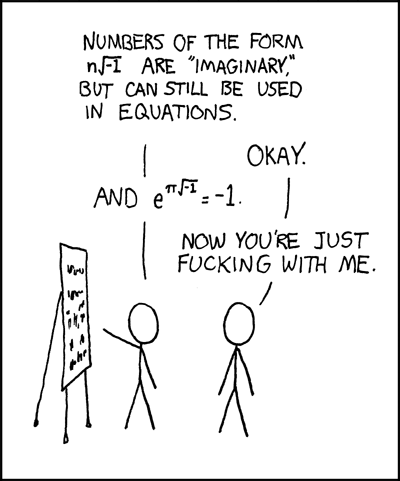
| FW 2009-10 Math 1200: Problems, Conjectures and Proof |

| Participation |
based on attendence and in class assignments |
10% |
| Assignments |
roughly one every 2 weeks |
25% |
| Investigation projects |
see below |
20% |
| Quizzes |
6 total, 3 per term, best 2 from each term |
15% |
| Final Examination |
Winter exam period |
30% |
| Lecture Schedule |
Topics |
Remarks |
| Sept 9/09 - Tutorial |
does not meet (wait until after first lecture) |
|
| Sept 15/09 Lecture #1 |
discuss class, lines breaks the board into regions |
homework #1 distributed |
| Sept 16/09 Tutorial 01 |
rectangles in a square grid |
|
| Sept 22/09 Lecture #2 |
problem solving strategies, logic, first past the post |
|
| Sept 23/09 Tutorial 02 |
rectangles in a square grid |
|
| Sept 29/09 Lecture #3 |
Chapter 2.1-2.9 in Chartrand, logic, tutologies, knights and knaves |
hw #1 due, homework #2 distributed |
| Sept 30/09 Tutorial 01 |
Solve the crime or do the time |
|
| Oct 6/09 Lecture #4 |
Quiz #1 |
|
| Oct 7/09 Tutorial 02 |
Solve the crime or do the time |
hw #1 to return |
| Oct 13/09 |
No class |
Reading week |
| Oct 14/09 |
No class |
Reading week |
| Oct 20/09 Lecture #5 |
quiz #1 review, pentagonal numbers and telescoping sums |
quiz #1 returned, hw #2 due, homework #3 distributed |
| Oct 21/09 Tutorial 01 |
opening and closing lockers |
|
| Oct 27/09 Lecture #6 |
'Investigation projects', exists and forall |
|
| Oct 28/09 Tutorial 02 |
opening and closing lockers |
hw #2 to return |
| Nov 3/09 Lecture #7 |
Quiz #2, hw #3 due, homework #4 distributed |
|
| Nov 4/09 Tutorial 01 |
Square take-away |
draft 1 of invest proj due |
| Nov 10/09 Lecture #8 |
justifying exists and forall statements |
return quiz #2, return tutorial 1 invest proj |
| Nov 11/09 Tutorial 02 |
Square take-away |
draft 1 of invest proj due |
| Nov 17/09 Lecture #9 |
sequences and patterns |
hw #4 due, homework #5 distributed |
| Nov 18/09 Tutorial 01 |
Hot dogs and buns |
|
| Nov 24/09 Lecture #10 |
Quiz #3 |
|
| Nov 25/09 Tutorial 02 |
Hot dogs and buns |
|
| Dec 1/09 Lecture #11 |
polynomials and sequences, tower of Hanoi |
final invest proj due for tutorial 1, hw #5 due, hw #6 distributed |
| Dec 2/09 Tutorial 01 |
Pick up sticks |
|
| Dec 8/09 Lecture #12 |
Induction |
return quiz #3, final invest proj due for tutorial 2 |
| Jan 5/09 Lecture #13 |
Induction and tower of Hanoi revisited |
hw #6 due |
| Jan 6/09 Tutorial 02 |
Pick up sticks |
|
| Jan 12/09 Lecture #14 |
Induction and differences of sequences |
return invest proj |
| Jan 13/09 Tutorial 01 |
Information around a table |
return hw#6 |
| Jan 19/09 Lecture #15 |
Differences of sequences |
Quiz #4 |
| Jan 20/09 Tutorial 02 |
Information around a table |
return hw#6 |
| Jan 26/09 Lecture #16 |
sets, subsets and relations |
hw #7 given |
| Jan 27/09 Tutorial 01 |
string around the earth |
|
| Feb 2/09 Lecture #17 |
relations |
return quiz #4 |
| Feb 3/09 Tutorial 02 |
string around the earth |
|
| Feb 6/09 |
Last day to drop the course without receiving a grade |
|
| Feb 9/09 Lecture #18 |
Forall/exists statements about relations |
Quiz #5, hw #7 due |
| Feb 10/09 Tutorial 01 |
Dividing up triangle |
|
| Feb 16/09 |
No class |
Reading week |
| Feb 17/09 |
No class |
Reading week |
| Feb 23/09 Lecture #19 |
modulo equivalence (sec 8.5), go over quiz #7, swan logic |
hw #8 given |
| Feb 24/09 Tutorial 02 |
Dividing up triangle |
|
| Mar 2/09 Lecture #20 |
more mod equivalence |
|
| Mar 3/09 Tutorial 01 |
factorial representation |
first draft of 2nd investigation project due |
| Mar 9/09 Lecture #21 |
Quiz #6, hw #8 due |
|
| Mar 10/09 Tutorial 02 |
factorial representation |
first draft of 2nd investigation project due |
| Mar 16/09 Lecture #22 |
one-to-one and onto functions |
hw #9 given |
| Mar 17/09 Tutorial 01 |
Exercises on relations, induction and summation notation |
|
| Mar 23/09 Lecture #23 |
||
| Mar 24/09 Tutorial 02 |
Exercises on relations, induction and summation notation |
|
| Mar 30/09 Lecture #24 |
review |
hw #9 due, final draft of 2nd investigation project due |
| Mar 31/09 Tutorial 01 |
| Tutorial 1 |
Tutorial 2 |
|
Stephanie Athayde Roman Ayala Deepali Bhikajee Sukhjit Brar Philip Christian Natalie Drumonde Meilin Duong Ming-Chieh Fan Suzette Fernandes Bao Huynh Dmitry Kryukovskiy Yee Lai Haein Lee Sanghyun Lee Laavanya Maheswaran Chia-Wei Mo Abdoul Niang Reubinder Sidhu Rajdeep Virk Elijah Wong Siu Wong |
Lynn Cao Cheng Chen Andrew Choly Diane Da Costa John Galinaitis Fei Guo Robert Jordan Ilana Khmurov Colman Ladouceur Robert Levy Kristeen Marshall Bebe Mustafa Trung Ngo Saayma Rangrez Ibrahim Shakul Patrick Sin Mitchell Williams Daniel Zinn |